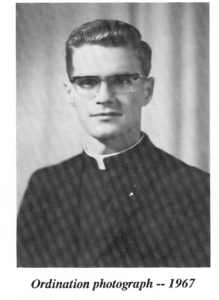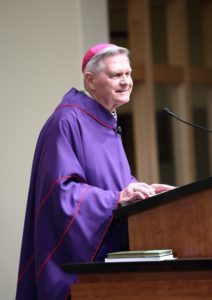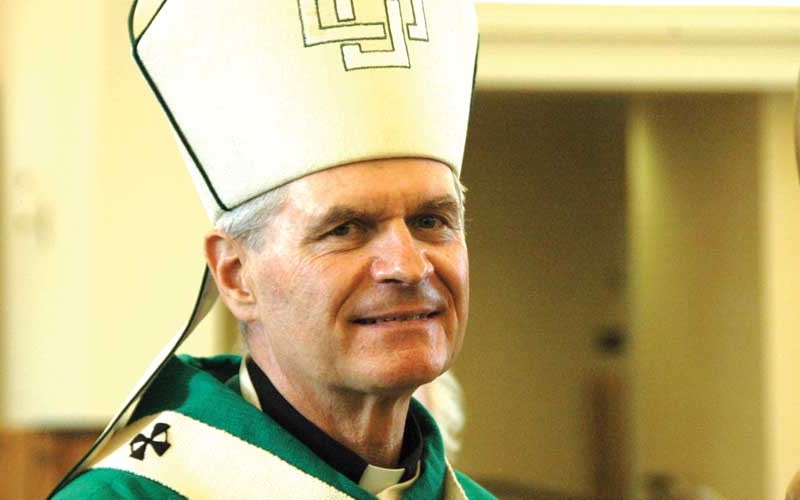Interview with Archbishop Roger Schwietz, OMI (TEC Episcopal Moderator Emeritus), Conducted by Janet Drey
Archbishop Roger Schwietz, OMI, has been a member of the TEC community since young adulthood. From 1990-2009, he served as the Episcopal Moderator of the TEC Conference, a role which provides spiritual leadership and representation in the community of bishops. He played a key role in the creation of the TEC Manual's first edition and in several key leadership transitions in the life of the TEC Conference.
When did you make your first TEC?
 I made my first TEC weekend as a young priest in my 30s while serving in International Falls, MN. The community there was preparing to start TEC in the summer of 1975 when I arrived. Before my arrival, Brother Pat McGee, OMI, and others had gone to St. Louis to experience a TEC weekend, and then brought the information up to International Falls. When I arrived, the community was preparing for their first TEC weekend that fall with the assistance of people from St. Louis.
I made my first TEC weekend as a young priest in my 30s while serving in International Falls, MN. The community there was preparing to start TEC in the summer of 1975 when I arrived. Before my arrival, Brother Pat McGee, OMI, and others had gone to St. Louis to experience a TEC weekend, and then brought the information up to International Falls. When I arrived, the community was preparing for their first TEC weekend that fall with the assistance of people from St. Louis.
How did your involvement in TEC evolve?
TEC went over very well in International Falls. We then combined with Fort Frances in Canada and created an international TEC called “Rainy River TEC.” TEC took off very quickly. Young people responded very well, and the younger Oblates became involved, which helped to provide training and outreach to young people. It was a really exciting experience, especially because TEC is focused around the Paschal Mystery. The Paschal Mystery was very much on our minds during those years because of the Second Vatican Council and the renewal of the liturgy. It all came together, and it was an exciting time for all of us.
How did you become involved at the TEC Conference level?
After our first TEC weekend, I started getting involved on the national level by going to the annual TEC Conventions (what the national gatherings were called in those days) and connecting with people from various TECs starting in our area: Crookston, MN; the Twin Cities TEC, etc. After our first or second year of TEC, we invited Fr. Matt Fedewa and Dorothy Gereke to visit International Falls during a special anniversary gathering.
In 1978, I was transferred to Omaha, NE, to work with college level seminarians at Creighton University. TEC already existed in Omaha. During these years, I got to know the now Cardinal Blase Cupich, who was a priest of the Omaha Archdiocese and was very supportive of TEC. I also got to know Fr. James Brown, OAR, who became Director of Youth and Young Adult Ministry in Omaha and Spiritual Director of the Omaha TEC community. My cousin Greg Schwietz and his wife Mary Lynn were very involved with Omaha TEC and dear friends of Fr. Jim. 
During these years, a group realized there was a need to renew the TEC manual. There was an effort to collect various manuals being used around the country. I was part of a group who met to study these manuals and find the best of what we wanted to create in a renewed national manual. We presented various formation workshops on different aspects of the TEC spiritual process.
After a lot of study, the revised TEC Manual was approved in 1997. By that time I was Bishop of the Diocese of Duluth, MN, and served as chair of the Bishops' Committee on Youth and Young Adult Ministry. We were working on the NFCYM document, Renewing the Vision of Youth Ministry. As the TEC Manual was approved, I was in a position to talk with other bishops and gain their support regarding the renewal of TEC. In 1998, during the ad limina visit for the bishops of Region 8, I invited Fr. Matt Fedewa, Dorothy Gereke, and Fr. Jim to come to Rome with me to present the new TEC Manual to his Holy Father, Pope John Paul II. It was an exciting culmination to our efforts. Later, I was informed that the new TEC Manual had been sent on to the office that takes care of youth issues, including the planning of World Youth Days.
What do you view as TEC’s unique contribution to the Church?
I think what was really important at the time was that the Church had found something intergenerational to bring together youth and adults in the context of sharing faith. Prior to Vatican II, learning about faith was based on a classroom model. TEC was an entirely different approach to learn, share, and celebrate faith in the context of Christian community. This is exactly what the Fathers of the Second Vatican Council wanted. TEC was centered around the core of our faith: the Paschal Mystery of Jesus Christ.
TEC was an entirely different approach to learn, share, and celebrate faith in the context of Christian community.
What memories do you have about Fr. Jim’s special emphasis on the need for ongoing formation for TEC leaders?
I recall that we were always struggling to remain true to the basis of the TEC process. There were leaders who were interested in adding elements to the TEC spiritual process which drew attention away from the core of TEC. So it became pretty clear that we needed a way to prepare our adult leaders to respect what is the core of TEC and what we were trying to accomplish. A TEC weekend is not just getting together to have fun.
In starting TEC, it is so important to choose the right adults and then provide ongoing formation. I think the involvement of deeply committed adults is the key to keeping the TEC Movement going and faithful to its core. With time, it has become more difficult to find enough adults who have the time to be deeply committed. I think this is a challenge that we need to look at and figure out how to get beyond. But I continue to be convinced that the genius of TEC is its intergenerational aspect of bringing people together to pass on, learn about, and share faith. TEC does a wonderful job with a life process of sharing the faith.
One additional realization that occurred to us at the time (and Fr. Jim saw this too) was that we had to prepare the Spiritual Directors of various movements well. And so, we held special Spiritual Director training sessions to ensure that the TEC Movement would move forward.

How did the Bishops' Committee come to be formed?
At one point in the renewal of the TEC Movement, we realized that among the bishops being named that there were many who had either experienced TEC as a young person or as a pastor. These bishops were acquainted with TEC. It seemed important to gather them together for mutual support and to ask how we might work together to promote the spirituality of TEC. I found that there were quite a few bishops who were interested in doing that. Of course, being busy with many other things made it difficult for them to do much beyond being in contact with one another and to promote the spirituality of TEC as well as financial support. But I could meet with them when we had our bishops’ meetings and let them know how TEC was doing and try to support them and the movements in their own areas.
You’ve retired in recent years. What blessings are you enjoying since your retirement?
It has been wonderful to be part of a parish again. I am involved at St. Andrew Parish (in Anchorage, AK), a large parish with only one priest which has allowed me to part of a community and be a pastor again. In a certain sense, through parish life I am being allowed to live the pieces of what we have in the TEC experience again. When you’re a bishop, you get very much caught up in administrative issues, and it is difficult to be a pastor. When I was on a TEC weekend, it gave me the opportunity to be a pastor, and now that I’m in a parish, I can again live this out while helping out at St. Andrew.
